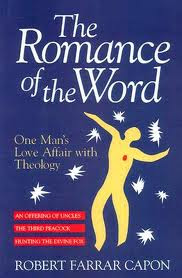 In 1974 the American Episcopalian priest Robert Farrar Capon had an experience so devastating to him that his life, as he understood it, was over. Though he was still physically breathing, death had come.
In 1974 the American Episcopalian priest Robert Farrar Capon had an experience so devastating to him that his life, as he understood it, was over. Though he was still physically breathing, death had come.He writes:
I was not just devastated, or hurt, or ill-used, or broken; I was dead. Unless you have been through such an experience, you may find this overblown; but my life, as I had known it, was over, gone, kaput.Capon then says a very interesting thing--
If I ever lived again--and it was inconceivable to me that I could--it would not be by my hand. Fairness or unfairness, guilt or innocence, blame or exculpation had nothing to do with the case. My life-designing capabilities were not impaired or in need of remedial treatment; I just didn't have my life anymore.He goes on to describe how new life began.
But far from being a sad state of affairs, that turned out to be the best news I had ever heard. My death was not the tragedy I first thought; it was my absolution, my freedom. Nobody can blame a corpse--especially not the corpse itself. Once dead, we are out from under all the blame-harrows and guilt-spreaders forever. We are free; and free above all from the messes we have made of our own lives.--Robert Farrar Capon, The Romance of the Word: One Man's Love Affair with Theology (Eerdmans, 1995), 8 (italics original)
And if there is a God who can take the dead and, without a single condition of credit-worthiness or a single, pointless promise of reform, raise them up whole and forgiven, free for nothing--well, that would not only be wild and wonderful; it would be the single piece of Good News in a world drowning in an ocean of blame. It was not all up to me . It was never up to me at all. It was up to someone I could only trust and thank.
It was salvation by grace through faith, not works.
So much I want to say about this. But I will leave it, for your own reflection. But be sure not to pass too quickly over the words, "especially not the corpse itself."
2 comments:
wow, this is perfect timing for an illustration I need. THANK you!
That's a fantastic summary of Paul's "justified from sin" in Romans 6:7, the result of our participation in Christ's death under sin's judgment.
Post a Comment